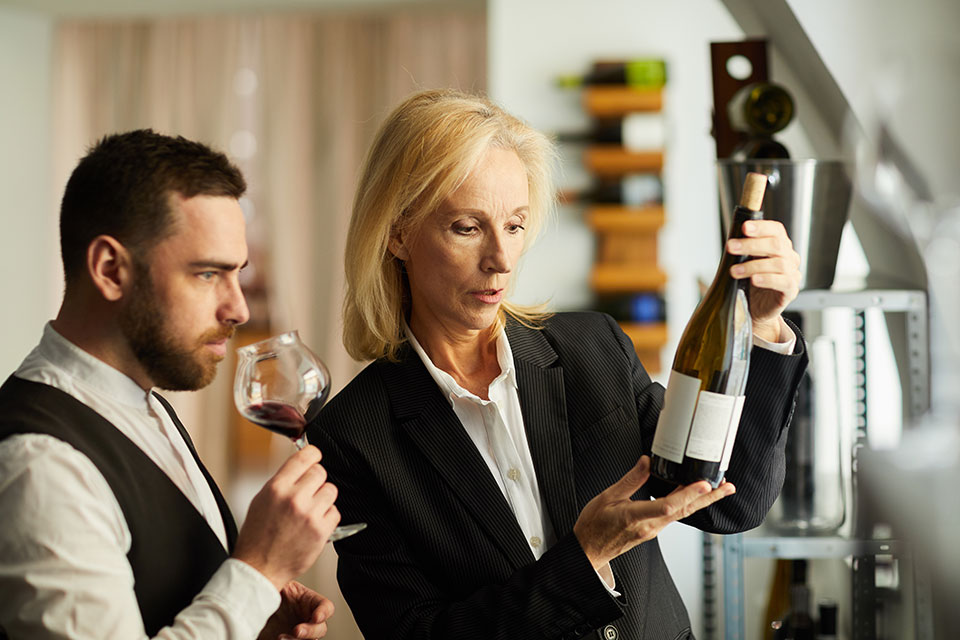What I learned from developing an online wine program

When I was tasked with creating a completely online course on Mastering Wine Tasting for César Ritz Colleges Switzerland, I was excited and a little daunted. But now that the course is up and running successfully, I realize that if it is possible to get students excited about learning wine tasting online, almost anything can be taught virtually!
There is a common belief that wine tasting is only related to the sampling of the beverage. However, our perception of wines can be completely altered by the temperature of serving, the flavor of the dish you ate before tasting, memories related to the wine, as well as scenery, lighting, and company. It is indeed a 100% sensory experience, but it isn’t only taste that matters in the equation.
In creating the online wine tasting course, we started by setting out the content, structure, and academic requirements, but were then faced with the challenge of how to translate the passion for wine via our screens. Fortunately, wine is an extremely visual subject!
At this stage, it was time for us to remove our educator hats and look at the content in the way that a producer or videographer would.
First, we split the visual content into four main categories:
- Theory communicated in a lecture format of that required a studio setting.
- Theory communicated in action, while walking though the vineyards, setting up a dinner table, or opening an aged bottle of wine.
- Interviews with experts recorded in a more static environment.
- And last, but not least, were the beauty shots.
The challenge was to take these four categories and present them in a way that was engaging to students and conveyed both the practical and more sensory experiences around wine tasting. Here are five key insights I gained as our team worked to achieve this:
- Beauty is key
Beautiful imagery matters! Academic research shows that contemplation and daydreaming are also categories of learning. They fuel the learners’ journey, increase motivation, and can be used as a powerful tool to engage your students.Creating captivating beauty shots is very labor intensive, and up to 50% of our recording time was taken up creating them. Next time you are watching your favorite Netflix show, pay attention to how often you see a static shot with an actor speaking in front of the camera versus the number of times you see a series of beautiful successive images supported with a voice over.
I truly believe that when teaching online, regardless of the subject matter, it is important to make your content as visual as possible. In our case, conversations about winemaking and vineyard management need to be supported with relevant footage of vineyards and winemaking practices in order to simplify complex concepts.
- Pay attention to how you appear on screen
When recording videos, it is crucial to focus on delivering the best experience for the viewer. While certain elements of body language, like hand gesticulations, can look natural in real life, on camera they can become distracting. - Don’t be alone
It has been proved that guest speakers enhance the credibility of information delivered within a course, whether it is being conducted offline or online. From a visual communications perspective, guest speakers provide a diversity of faces and therefore make the video more engaging.Once basic concepts within our course had been identified, interviews with experts helped us put this knowledge into perspective and demonstrate its value in the industry.
- Share stories
Just like children, we all love stories! To hold your audience’s attention, don’t spend more than five minutes on theory without including a personal anecdote or story related to the subject. - Simplify, but not too much
Being able to simplify any topic is great for the audience but be careful not to dumb it down too much. We live in a time when it is easy for almost anyone to find information about a specific subject online, so be creative and deliver content that is not easily accessible, and make it interesting through stories and engaging imagery.
While teaching online, regardless of the subject, might seem daunting, there can be many positive outcomes. Creating the online Mastering Wine Tasting course encouraged myself and my team to come up with alternative methods that in many ways suited our purpose even more effectively than the offline tools we used before.
The mastermind behind a Swiss hospitality school’s innovative online wine tasting course, Anastasiia Burakovskikh, shares her five top tips and insights on creating engaging virtual content for students. Have you read?
World’s Most Forward-Thinking Countries.
World’s Best Countries For Raising Kids.
World’s Most Entrepreneurial Countries.
World’s Best Countries to Headquarter Multinational Corporations (MNCs).
Best Hospitality And Hotel Management Schools In The World.
Bring the best of the CEOWORLD magazine's global journalism to audiences in the United States and around the world. - Add CEOWORLD magazine to your Google News feed.
Follow CEOWORLD magazine headlines on: Google News, LinkedIn, Twitter, and Facebook.
Copyright 2025 The CEOWORLD magazine. All rights reserved. This material (and any extract from it) must not be copied, redistributed or placed on any website, without CEOWORLD magazine' prior written consent. For media queries, please contact: info@ceoworld.biz









